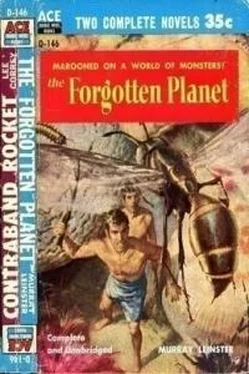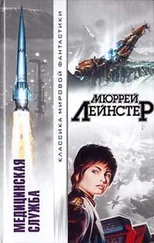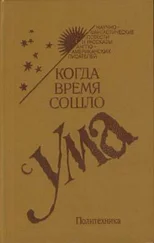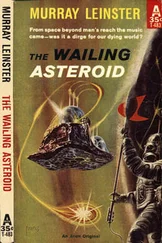The Forgotten Planet
Murray Leinster
Nature's Mislead Madhouse!
Beneath dense gray clouds through which no sun shone lay a forgotten planet. It was a nightmare world of grotesque and terrifying animal–plant life. Gigantic beetles, spiders, bugs and ants filled the putrid, musty earth—ready to kill and devour anything in sight.
There were men amidst this horror—men who cringed and ran from the ravening monsters and huddled in the mushroom forests at night.
Burl was one of these creatures. But one day inspiration hit Burl. He would find a weapon—he would fight back.
And with this idea the first step was taken in man's most desperate flight for freedom in this most horrible of all worlds. But it was only a first step.
About the Characters in This Book
This is something of an oddity among fiction stories, because some of its characters may be met in person if you wish. Down at the nearest weed–patch or thicket you are quite likely to see a large and unusually perfect spider–web with a zig–zag silk ribbon woven into its center. Its engineer is the yellow–banded garden spider ( Epeira Fasciata ) whose abdomen may be as big as your thumb. I do not name it to impress you, but to suggest a sort of science–fiction experience.
Take a bit of straw and disturb the web. Don't break the cables. Simply tap them a bit. The spider will know by the feel of things that you aren't prey and that it can't eat you. So it will set out frightening you away. It will run nimbly to the center of the web and shake itself violently. The whole web will vibrate, so that presently the spider may be swinging through an arc inches in length, and blurred by the speed of its swing. You are supposed to be scared. When you are alarmed enough, the spider will stop.
That spider, very much magnified, is in this book with crickets and grasshoppers and divers beetles you may not know personally. But this is not an insect book, but science–fiction. If the habits of the creatures in it are authentic, it is because they are much more dramatic and interesting than things one can invent.
Murray Leinster
The Survey–Ship Tethys made the first landing on the planet, which had no name. It was an admirable planet in many ways. It had an ample atmosphere and many seas, which the nearby sun warmed so lavishly that a perpetual cloud–bank hid them and most of the solid ground from view. It had mountains and continents and islands and high plateaus. It had day and night and wind and rain, and its mean temperature was within the range to which human beings could readily accommodate. It was rather on the tropic side, but not unpleasant.
But there was no life on it.
No animals roamed its continents. No vegetation grew from its rocks. Not even bacteria struggled with its stones to turn them into soil. So there was no soil. Rock and stones and gravel and even sand—yes. But no soil in which any vegetation could grow. No living thing, however small, swam in its oceans, so there was not even mud on its ocean–bottoms. It was one of that disappointing vast majority of worlds which turned up when the Galaxy was first explored. People couldn't live on it because nothing had lived there before.
Its water was fresh and its oceans were harmless. Its air was germ–free and breathable. But it was of no use whatever for men. The only possible purpose it could serve would have been as a biological laboratory for experiments involving things growing in a germ–free environment. But there were too many planets like that already. When men first traveled to the stars they made the journey because it was starkly necessary to find new worlds for men to live on. Earth was over–crowded—terribly so. So men looked for new worlds to move to. They found plenty of new worlds, but presently they were searching desperately for new worlds where life had preceded them. It didn't matter whether the life was meek and harmless, or ferocious and deadly. If life of any sort were present, human beings could move in. But highly organized beings like men could not live where there was no other life.
So the Survey–Ship Tethys made sure that the world had no life upon it. Then it made routine measurements of the gravitational constant and the magnetic field and the temperature gradient; it took samples of the air and water. But that was all. The rocks were familiar enough. No novelties there! But the planet was simply useless. The survey–ship put its findings on a punched card, six inches by eight, and went hastily on in search of something better. The ship did not even open one of its ports while on the planet. There were no consequences of the Tethys' visit except that card. None whatever.
No other ship came near the planet for eight hundred years.
Nearly a millenium later, however, the Seed–Ship Orana arrived. By that time humanity had spread very widely and very far. There were colonies not less than a quarter of the way to the Galaxy's rim, and Earth was no longer over–crowded. There was still emigration, but it was now a trickle instead of the swarming flood of centuries before. Some of the first–colonized worlds had emigrants, now. Mankind did not want to crowd itself together again! Men now considered that there was no excuse for such monstrous slums as overcrowding produced.
Now, too, the star–ships were faster. A hundred light–years was a short journey. A thousand was not impractical. Explorers had gone many times farther, and reported worlds still waiting for mankind on beyond. But still the great majority of discovered planets did not contain life. Whole solar systems floated in space with no single living cell on any of their members.
So the Seed–Ships came into being. Theirs was not a glamorous service. They merely methodically contaminated the sterile worlds with life. The Seed–Ship Orana landed on this planet—which still had no name. It carefully infected it. It circled endlessly above the clouds, dribbling out a fine dust,—the spores of every conceivable microörganism which could break down rock to powder, and turn that dust to soil. It was also a seeding of moulds and fungi and lichens, and everything which could turn powdery primitive soil into stuff on which higher forms of life could grow. The Orana polluted the seas with plankton. Then it, too, went away.
More centuries passed. Human ships again improved. A thousand light–years became a short journey. Explorers reached the Galaxy's very edge, and looked estimatingly across the emptiness toward other island universes. There were colonies in the Milky Way. There were freight–lines between star–clusters, and the commercial center of human affairs shifted some hundreds of parsecs toward the Rim. There were many worlds where the schools painstakingly taught the children what Earth was, and where, and that all other worlds had been populated from it. And the schools repeated, too, the one lesson that humankind seemed genuinely to have learned. That the secret of peace is freedom, and the secret of freedom is to be able to move away from people with whom you do not agree. There were no crowded worlds any more. But human beings love children, and they have them. And children grow up and need room. So more worlds had to be looked out for. They weren't urgently needed yet, but they would be.
Therefore, nearly a thousand years after the Orana , the Ecology–Ship Ludred swam to the planet from space and landed on it. It was a gigantic ship of highly improbable purpose. First of all, it checked on the consequences of the Orana's visit.
They were highly satisfactory, from a technical point of view. Now there was soil which swarmed with minute living things. There were fungi which throve monstrously. The seas stank of minuscule life–forms. There were even some novelties, developed by the strictly local conditions. There were, for example, paramoecia as big as grapes, and yeasts had increased in size until they bore flowers visible to the naked eye. The life on the planet was not aboriginal, though. All of it was descended and adapted and modified from the microörganisms planted by the seed–ship whose hulk was long since rust, and whose crew were merely names in genealogies—if that.
Читать дальше







